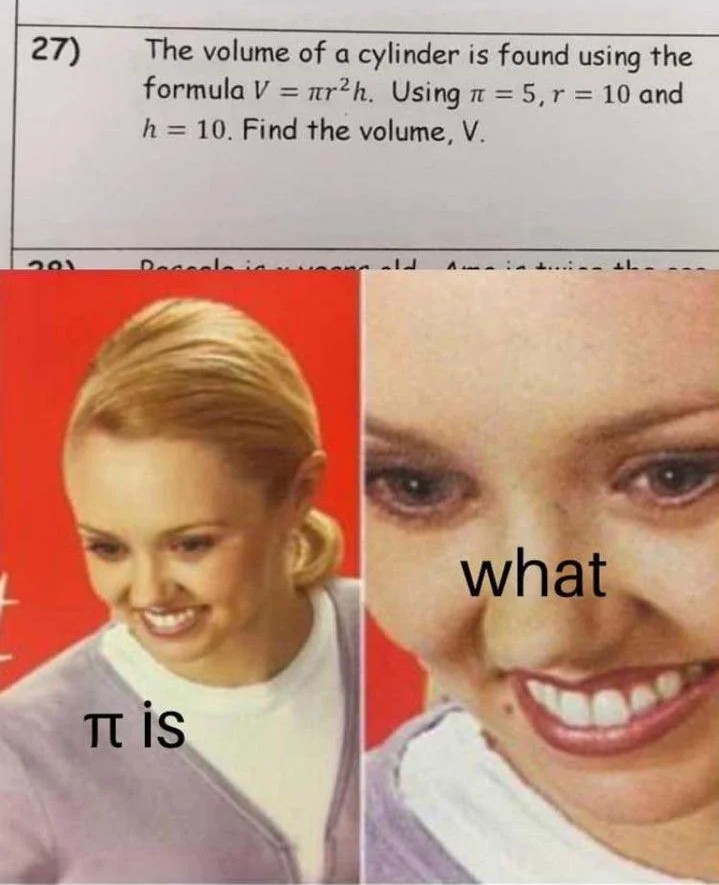this post was submitted on 21 Apr 2024
418 points (96.2% liked)
Science Memes
11004 readers
2725 users here now
Welcome to c/science_memes @ Mander.xyz!
A place for majestic STEMLORD peacocking, as well as memes about the realities of working in a lab.

Rules
- Don't throw mud. Behave like an intellectual and remember the human.
- Keep it rooted (on topic).
- No spam.
- Infographics welcome, get schooled.
This is a science community. We use the Dawkins definition of meme.
Research Committee
Other Mander Communities
Science and Research
Biology and Life Sciences
- [email protected]
- [email protected]
- [email protected]
- [email protected]
- [email protected]
- [email protected]
- [email protected]
- [email protected]
- [email protected]
- [email protected]
- [email protected]
- [email protected]
- [email protected]
- [email protected]
- [email protected]
- [email protected]
- [email protected]
- [email protected]
- [email protected]
- [email protected]
- [email protected]
- [email protected]
- [email protected]
- [email protected]
- !reptiles and [email protected]
Physical Sciences
- [email protected]
- [email protected]
- [email protected]
- [email protected]
- [email protected]
- [email protected]
- [email protected]
- [email protected]
- [email protected]
Humanities and Social Sciences
Practical and Applied Sciences
- !exercise-and [email protected]
- [email protected]
- !self [email protected]
- [email protected]
- [email protected]
- [email protected]
Memes
Miscellaneous
founded 2 years ago
MODERATORS
you are viewing a single comment's thread
view the rest of the comments
view the rest of the comments

Well, a r=10 and h=10 doesn't mean much without units. 10 what? Feet? Meters? Inches? CM?
Let's take the OG numbers and assume feet, so 5,000 cubic feet. That's not a useful volume measurement.
1 cubic foot of water = 7.48052 gallons
So 5,000 cubic feet of water = 37,402.6 gallons. That's a viable volume measurement.
1 cubic meter = 1,000 liters.
5,000 cubic meters = 5,000,000 liters.
Its not supposed to mean anything, it's about the equation not about the end result. We're not calculating an actual cilinder
If we're not calculating something useful, then why are we here and not in the library learing about the universe?
Better question: What curvature of space is necessary for the apparent value of π to be 5?
We're learning maths, which is arguably the foundation of the universe.
I'm afraid that that is beyond the comprehension of my human existence
~~honestly I don't know if there is any way to measure curvature of space , but its slightly more curved than the surface of a ball (where π=~4.712)~~
edit : its more complex than that and topology of non euclidean spaces hurts
Kind of curious how you got that value. I think the ratio of circumference to diameter ("pi") is actually smaller in spherical geometry, in the most extreme case (the equator) it's just 1. You could say "pi = 5" for circles of a specific radius in hyperbolic geometry, I guess.
my mistake was using the sum of angles in a triangle which was kinda dum but whatever . I also tried calculating via the circumstance of a circle placed at a pole where π was 20x smaller for the case I was using but its not linear so I looked deeper which was a big mistake .
BTW the ratio of circumstance to radius for a circle which is also an equator of the space is ¼ not 1 (r=½π₀ , C=2π₀) .
I think you mean 4, which makes the ratio of circumference to diameter 2 (either way, no idea how I messed up that one).
oopsie :3
The unit is unit.
The math doesn’t care, and what you’re on about only really matters if the units don’t start as all the same or if you start converting between things.